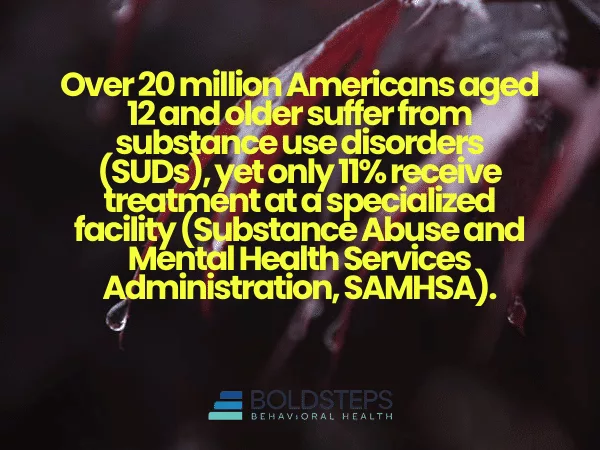Addiction is a multidimensional disorder that impacts the body, mind, and soul. Although recovering from it is difficult, it is achievable with a systematic approach. There is no universal solution for addictions therapy. It requires a customized strategy based on the demands of the consumer and the extent of their addiction.
To assist you or a loved one better comprehend the path to recovery, this guide exposes the key stages of addiction treatment.
Why Addiction Treatment Must Be Comprehensive
Addiction is not a simple habit that can be broken overnight. It is a chronic condition that alters brain chemistry and impacts emotions, behavior, and relationships. Comprehensive treatment ensures that every aspect of addiction is addressed, from the physical effects of withdrawal to the underlying psychological and social factors that contribute to substance use.
The stages of addiction treatment are designed to provide structure and support at every step of the recovery process. These stages include:
Stage 1: Acknowledging the Problem
Addiction treatment begins with acknowledging the need for assistance. Denial can be a major obstacle for many people. It’s critical to recognize how addiction affects one’s life and the daily lives of those one loves. Aid from friends, family, or medical professionals can help people recognize this and decide to get treatment.
Stage 2: Detoxification
The process of eliminating risky substances from the body is known as detoxification, and it is frequently completed at a drug detox center. For those who have been physically dependent on drugs or alcohol, detox is crucial. Patients go through their withdrawal phase under medical care, which may involve treating symptoms including anxiety, sleeplessness, and nausea.
Medical detox ensures the process is safe and reduces the risk of complications. This stage lays the foundation for further treatment by stabilizing the patient physically and mentally.
Stage 3: Rehabilitation and Therapy
- Inpatient Addiction Treatment Programs
For individuals with serious addiction problems, inpatient programs offer a controlled and absorbed environment. Depending on the needs of the patient, these programs often last a period of thirty days, sixty days, or 90.
During this phase, therapy plays a pivotal role. Individual counseling, group therapy, and behavioral therapies like Cognitive Behavioral Therapy (CBT) are used to address the root causes of addiction, build coping mechanisms, and prevent relapse.
- Partial Hospitalization Program (PHP)
A Partial Hospitalization Program is a step down from inpatient care, offering intensive treatment during the day while allowing patients to return home at night. PHP is beneficial for those who need structured care but have a stable home environment to support their recovery.
- Outpatient Treatment Programs
For those with mild to moderate addiction, an Outpatient Treatment Program offers flexibility. Patients attend scheduled therapy sessions and support groups while maintaining their daily responsibilities like work or school. This program is also an excellent option for individuals transitioning from inpatient or partial hospitalization programs.
Stage 4: Addressing Co-occurring Disorders
Many individuals struggling with addiction also face mental health issues like anxiety, depression, or PTSD. Dual diagnosis treatment, integrated within an Addiction Treatment Program, addresses both the addiction and the co-occurring disorders simultaneously. Treating both conditions is vital for long-term recovery and reducing the risk of relapse.
Stage 5: Aftercare and Long-Term Support
Recovery doesn’t end with completing addiction treatment program. Long-term sobriety requires consistent effort and support. Programs for aftercare are essential for maintaining recovery and avoiding recurrence. Such efforts may consist:
- Regular counseling sessions
- Peer support groups
- Family therapy
- Continued participation in outpatient services
Follow-up is a vital part of the process of recovery at Bold Steps Behavioral Health, giving clients the means to maintain a happy and satisfying life.
Why a Multi-Stage Approach Is Essential
Each stage of addiction treatment serves a specific purpose in the recovery process. Skipping any stage increases the risk of relapse and diminishes the effectiveness of the overall program. A multi-stage approach ensures that individuals receive comprehensive care, addressing all aspects of addiction and building a strong foundation for long-term sobriety.
How Bold Steps Behavioral Health Can Help
At Bold Steps Behavioral Health, we are committed to guiding individuals through every stage of their recovery journey. Our customized treatment plans are designed to address the unique needs of each client, ensuring the best chance for success.
Our Services Include:
- Drug Detox Center and Alcohol Detox Center: Safe, medically supervised detoxification.
- Addiction Treatment Programs: Comprehensive plans tailored to individual needs.
- Partial Hospitalization Program (PHP): Intensive therapy with flexible evening options.
- Intensive Outpatient Program (IOP): Combines structured care with real-world flexibility.
- Outpatient Treatment Program: Long-term support for maintaining sobriety.
Conclusion
Addiction recovery is a multi-stage process that requires dedication, support, and the right treatment plan. Whether you’re seeking a safe Drug Detox Center or an effective Outpatient Treatment Program, choosing a reliable provider like Bold Steps Behavioral Health can make all the difference. By understanding and embracing the stages of addiction treatment, you or your loved one can take the Bold Steps Behavioral Health toward a healthier, addiction-free life.
If you or a loved one is struggling with addiction, Bold Steps Behavioral Health is here to help. Contact us today at (717) 702-6335 to learn more about our programs and take the first bold step toward a brighter future.
FAQ on Stages of Addiction Treatment
What are the stages of addiction treatment?
The stages of addiction treatment typically include assessment and evaluation, detoxification, rehabilitation and therapy, and aftercare and relapse prevention.
Why is detoxification important in addiction treatment?
Detoxification removes harmful substances from the body and manages withdrawal symptoms, providing a safe foundation for the next stages of recovery.
What types of therapy are included in addiction treatment?
Addiction treatment often includes individual therapy, group therapy, family therapy, and holistic therapies like yoga and mindfulness.
What is aftercare in addiction treatment?
Aftercare includes ongoing support such as sober living homes, therapy, support groups, and relapse prevention strategies to maintain long-term sobriety.
How can Bold Steps Behavioral Health help with addiction recovery?
Bold Steps Behavioral Health offers a range of services, including Drug Detox Centers, Alcohol Detox Centers, Addiction Treatment Programs, and outpatient support to guide individuals through every stage of recovery.





